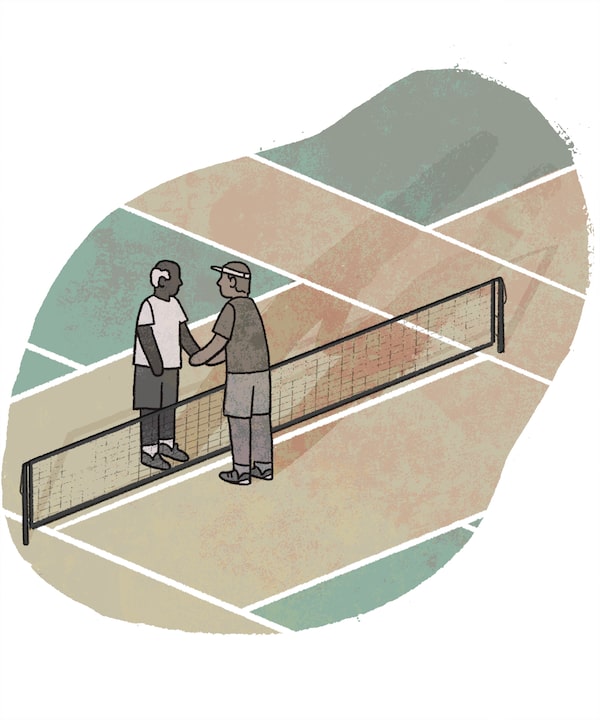First Person is a daily personal piece submitted by readers. Have a story to tell? See our guidelines at tgam.ca/essayguide.

Illustration by Marley Allen Ash
I used to ask my clients if I could be “honest” with them, believing that they needed to be told what I thought and not what they wanted to hear. But honesty isn’t just about telling the truth.
Honesty involves self-awareness and overriding the human tendency to deny, minimize, justify and rationalize what we know to be the truth.
Recently, to be honest with myself, I had to stop denying that a near-death medical experience five years ago hadn’t dramatically altered the arc of my life. I was ecstatic that I was alive, but I was angry about what had happened to me. I wanted answers about how a simple infection had nearly killed me.
The answers that I was looking for appeared in an odd location: the pickleball court. It was there that I spotted Sam (not his real name), the physician I had seen shortly after my finger had become infected.
Trusting your intuition is an aphorism I had always believed in. My intuition told me that Sam had incorrectly diagnosed and treated my infection, which led to more than a month in the hospital and ongoing recovery. I began a year-long process of research and consultation that culminated in a medical complaint decision confirming that Sam had, indeed, erred in his diagnosis and treatment.
Sam’s errors were critical. The medical decision, though, was careful to state that even if my doctor had correctly diagnosed and treated me it was impossible to say if the outcome, a ruptured infected aneurysm and septic shock 11 days later, would have been different.
Naturally, my reaction to seeing Sam on the pickleball court was visceral. He was a trigger for the trauma of my near-death experience. Whenever I saw him I felt like my blood pressure was going through the roof and I couldn’t concentrate on the game. Not only did we play at the same pickleball level, but we also played at the same two locations. I began thinking that I needed an apology from Sam if I was ever going to begin to put my medical nightmare behind me.
I knew that apologies can be difficult to come by, and apologies are particularly difficult for physicians whose careers and egos are inextricably connected to saving lives. No one becomes a physician thinking that they will harm someone.
Sam was no exception in this regard. Even with the recent medical-complaint decision in my favour, he appeared to be oblivious to the impact that his actions and presence had on me.
But I am a believer that apologies can benefit both the receiver and the giver. One day, while waiting for a court to open up, I found myself standing near Sam. I ruminated and obsessed about his presence and finally decided to speak up and ask him what he thought about this recent complaint decision.
When I started talking with Sam I wasn’t following a script, precedent or protocol, because there simply are none. I let my intuition guide me.
Initially, he was defensive and denied wrongdoing, which is exactly the response that I expected. Taking responsibility for mistakes is never easy. The greater the culpability and the more serious the mistakes and the consequences are, the harder it is to be honest with oneself.
But I pointed out the overwhelming evidence that he had incorrectly diagnosed and treated me. I highlighted that 11 days after seeing him I ended up almost dying, spending a week in a coma and three weeks in the ICU. As well, I emphasized the devastating impact that my near-death experience had on my wife and two young adult sons.
I asked Sam for an apology and walked away when he equivocated.
To Sam’s credit, he followed me and eventually offered an apology. He said he was sorry and wouldn’t wish what happened to me on anyone. He also stated that he was human and, as such, had probably made mistakes in his long medical career. The impact this had on me was palpable. I calmed down right away and began to see Sam in a different light.
The power of an apology lies in the acknowledgment of remorse and admission of responsibility for mistakes made. This introduces a positive element into something that, up to that point, had been entirely negative. After Sam’s apology, we were able to talk about the importance of learning from our mistakes. And, now, we can chat happily about the challenges we face as septuagenarian pickleball players.
What I discovered with Sam is that if you can get past the protective shield that prevents people from honestly looking at themselves, you can have a reasonable discussion that reflects a common ground and a shared humanity.
I can now play pickleball with Sam without the kind of animosity that would have seen me hammering balls at him. But the real benefit of what transpired between us points to the value of honesty and the power of an apology.
Sam and I were able to see each other as fallible, vulnerable and decent human beings who were brought together in an unfortunate set of circumstances.
Mac Horsburgh lives in Winnipeg.